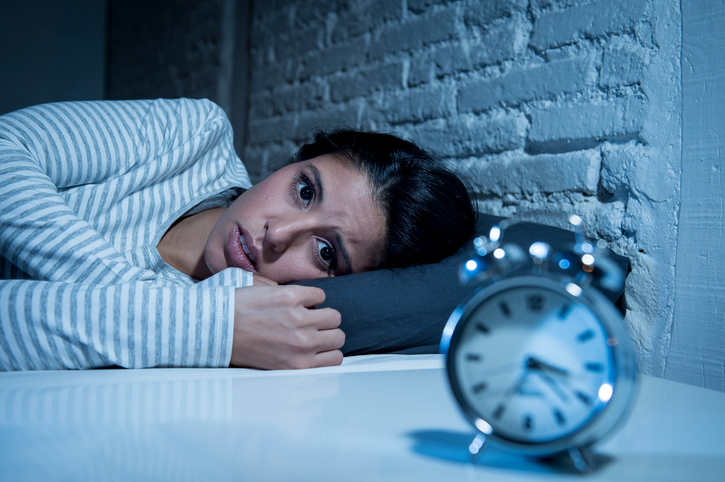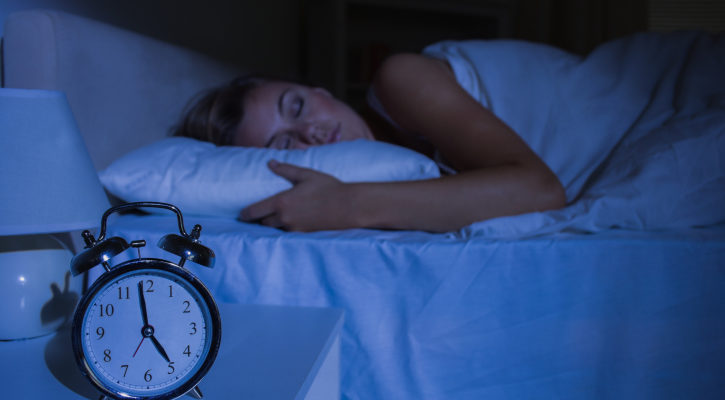Your Body on Sleep Deprivation
Article posted in: Lifestyle
Nearly one third of Americans get fewer than seven hours of sleep a night, according to a study done by the Centers for Disease Control and Prevention (CDC).
Bragging about burning the midnight oil? Not so cool. The CDC also lists insufficient sleep as a public health problem. That’s right: Sleep deprivation is a health risk, just like smoking and obesity.
Living our lives in a state of sleepiness isn’t a superpower. Sleeping less to do more isn’t productive. Sleep deprivation puts you at risk for a multitude of diseases. Hypertension, diabetes, depression, heart attacks and strokes are just a few of the likely risks of sleep insufficiency mentioned by the Institute of Medicine. Burning the midnight oil is actually just burning your chances of health and wellness.
So how do you know if you’re sleep deprived?
The National Institutes of Health (NIH) recommends seven to eight hours of sleep per night for adults. If you’re getting less, you’re likely deprived. Do you often feel like you can doze off while watching TV? Or struggle to stay alert in a meeting or a car? All of these things can be symptoms of sleep deprivation. Only get six hours of shut-eye a night try to but make up for it with some daytime naps? Research suggests that napping doesn’t have all the benefits of night time sleep. The NIH says that you can’t make up for lost sleep.
Here are 10 significant consequences of sleep deprivation:
1. Depression/Moodiness
While the depression/sleep deprivation debate may be similar to the chicken and the egg scenario, research suggests that the risk of developing depression is highest amongst those suffering from sleep insomnia. We all have experienced it. We have a terrible night’s sleep. We’re irritable, short tempered and grumpy. But getting a good night’s sleep has you waking up on the right side of the bed—happy, calm and ready to take on the day.
2. Cognitive Dysfunction
The CDC says 49.2 million Americans report having trouble concentrating and 38 million have trouble remembering things. These sleep-related difficulties are cognitive dysfunction. The scariest part about this is that the National Department of Transportation estimates drowsy driving is the underlying cause of 40,000 injuries and 1,550 fatalities each year. Sleep deprivation risks go beyond forgetting your lunch on the counter. The resulting dysfunction could be dangerous.
3. Weak immune system
Cold and flu season is here. We need our bodies to be in fighting form. A weak immune system can make for a sickly season. Research has shown a direct link between a weakened immune system and sleep deprivation. Research taken by the University of Pennsylvania found short-term loss of sleep had a direct and significant impact on immune system functioning. UCLA Cousins Center Research found an increase in inflammation triggered by even the smallest amount of sleep loss. The connection? Our bodies need sleep to stay healthy.
4. Micro Sleep
When you’re exhausted, your body can switch into sleep mode without warning. A person can appear awake with their eyes wide open, while their brain is actually snoozing. It might only be for a few seconds, but micro sleepers are completely unaware that you’ve slipped into zzzz land. This is especially dangerous while driving or operating heavy machinery. A red light, a curve in the road or a short stop can all spell disaster.
5. High blood pressure
Hypertension and sleep deprivation very often exist simultaneously. But why? The Mayo Foundation for Medical Education and Research explains that sleep allows us to regulate stress hormones efficiently. Basically, our modern, sleep-deprived lifestyle leaves our stress systems in over drive. Long periods of rest give bodies the time they need to reset.
6. Heart Disease
Sleep is essential for a healthy heart. Removing other risk factors such as age, weight, smoking and a sedentary lifestyle, those who get fewer than six hours of sleep per night were at higher risk for heart disease, according to The National Sleep Foundation. Sleep deprivation isn’t worth putting yourself at even higher risk. Take care of your heart and make sleep a must.
7. Obesity
Sleep is often the missing piece in the weight loss puzzle. The National Sleep Foundation links daytime sleepiness and a possible decrease in motivation to diet and exercise. Your hormones may sabotage you as well. The National Sleep Foundation also reports leptin levels fall with too little sleep, promoting an increase in appetite.
8. Over-caffeinating
The more tired we are, the more pots of coffee we brew. The more pots of coffee we brew, the harder it is for us to fall asleep at night. And so, the viscous cycle of caffeine consumption begins. Too much caffeine can lead to irritability, stomach discomfort and tremors.
9. Diabetes
Type 2 diabetes occurs when the body is no longer able to regulate glucose (sugar). In 1999, the University of Chicago published a study that reported restricting sleep to four hours per night for just a week created glucose and endocrine characteristics of a diabetic. Researchers have known for decades that sleep deprivation affects hormone levels and specifically the body’s ability to regulate glucose.
10. Cancer
The International Journal of Cancer published a study that found the rate of breast cancer was 30 percent higher for women who had shift work. Shift work disrupts our body’s natural circadian rhythm also known as our sleep-wake cycle. When the body’s biological clock is disrupted we may be at an increased risk of certain cancers. While shift work may not be avoidable, the National Sleep Foundation offers suggestions, like switching shifts in a clockwise direction, to help to cope with the schedule and develop healthier sleep habits.











